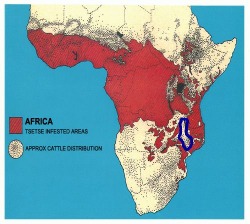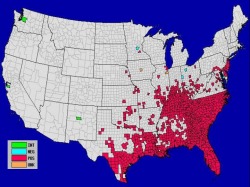AHT is one of the most dreaded tropical diseases, with good reason - it is invariably fatal in the absence of proper treatment. Over 60 million people in sub-Saharan Africa are at risk and 50,000 die each year. The main vector of AHT is the tsetse fly, and control efforts have focused on eliminating this insect from endemic regions. During the 1980's and 1990's, a successful vector control program virtually eliminated the tsetse fly from Malawi, but as the disease burden decreased, funding stopped and now it appears that they fly has returned to northern Malawi.
Dengue fever - also known as "breakbone fever" for the severe pain caused by the first infection - is the most common vector-borne viral disease worldwide. The first infection is rarely fatal, but there are four different dengue serotypes. Infection with one serotype confers immunity to that serotype, but if someone who has already been infected with one dengue serotype is infected by a different serotype, dengue hemorrhagic fever, a life-threatening illness, can result.
In May 2010, the Centers for Disease Control and Prevention (CDC) announced the first locally acquired case of dengue Fever in the United States since 1946 - and that there had likely been an ongoing outbreak of dengue in the Florida Keys since 2009. A serosurvey found that up to 5% of all Florida Keys residents have been exposed to dengue. Yes, you read the first part of that sentence correctly - we eliminated dengue from the United States when we eliminated malaria (both using vector control strategies) in the mid-40's, and now it's back.
The Florida Keys are a major tourist destination, and the main fear is that dengue will spread from the Keys to the rest of the United States when travelers return home. Many of the mosquitoes in the United States are capable of transmitting the virus, so the possibility of spread is a real concern. The map below shows the distribution of Aedes albopictus, one of the main vectors of dengue, in the United States. It is present in all of the counties in red, and absent from those in blue. Gray counties represent those that the Division of Vector-Borne Infectious Diseases (DVBID) didn't have the necessary funding or manpower to survey.
More on the dengue outbreak can be found at:
White Coat Underground
TIME


 RSS Feed
RSS Feed